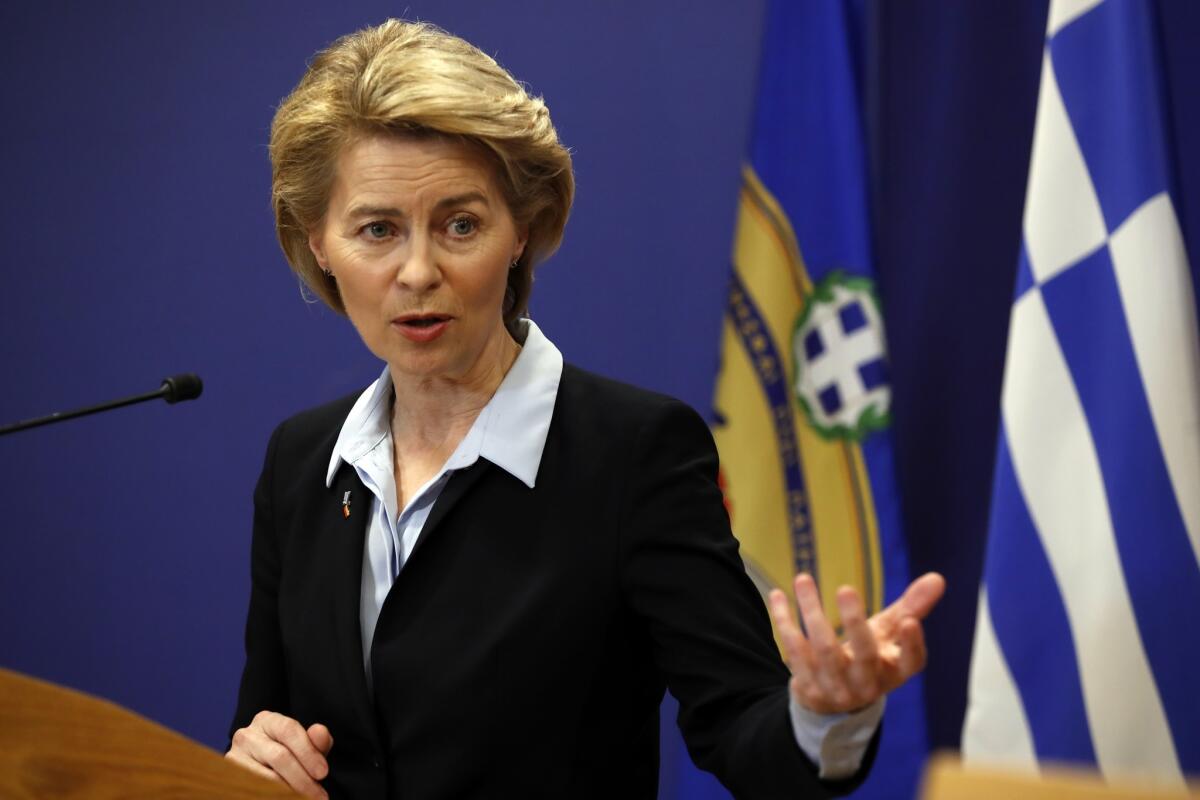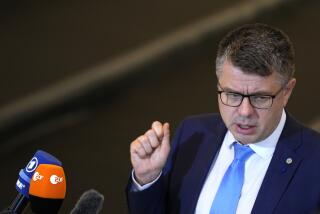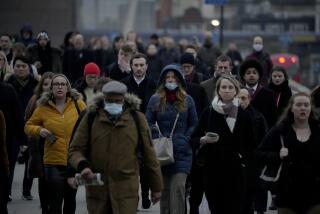EU considers sweeping travel ban, but it might be too late

BRUSSELS — The European Union moved on Monday to ban nonessential travel into the bloc to mitigate the transmission of the coronavirus, an extraordinary measure for a continent that prides itself on freedom of movement.
Ursula von der Leyen, president of the European Commission, proposed a 30-day ban that would cover all 27 European Union countries except Ireland. She encouraged other European countries, including Britain and non-EU members in the passport-free Schengen zone, to match their travel restrictions.
“The less travel we have, the more we can contain the virus,” she said Monday in a video statement.
Although the commission is expected to vote on the proposal on Tuesday, it may be too late to prevent the members of the European Union from going in their own directions — a challenge the bloc confronted in 2015, when a surge of migrants, most of them from the Middle East and Africa, flooded into Europe fleeing war, poverty and despair.
On Sunday, Germany moved to impose travel restrictions along most of its borders, without having informed Austria or other neighboring countries. Several European Union members — including the Czech Republic, Slovakia, Poland, Portugal and Denmark — have also taken moves to impose border restrictions, in some cases with little advance notification.
The World Health Organization has declared Europe the new epicenter of the COVID-19 outbreak. Italy, Spain and France — the three countries that have borne the brunt of the virus in Europe — have all imposed sweeping restrictions on internal movements and commerce, shutting down bars and restaurants and severely limiting domestic travel.
Italy had 28,000 confirmed cases and more than 2,100 deaths as of Monday night, the most deaths of any country outside of China. Facing the mounting death toll, Italian Prime Minister Giuseppe Conte last week put the country on lockdown, ordering residents to remain in their homes. The nation’s hospital system has been overwhelmed, forcing health workers to make anguishing choices on whom to prioritize for care.
In Spain, where the number of coronavirus infections has skyrocketed to nearly 10,000, Prime Minister Pedro Sánchez announced a nationwide quarantine on Saturday. Residents are permitted to leave their homes only in necessary circumstances such as purchasing groceries or going to the pharmacy. Those who break quarantine face fines of up to $3,350 or a year in jail.
Last week, President Trump barred most Europeans from traveling to the United States — a move that sparked condemnation from European leaders for having been made without their consultation.
In her video statement, Von der Leyen said she had notified leaders of the Group of 7 advanced industrialized economies before making the planned Schengen area travel ban public.
Some members of the European Parliament, who were working from their home countries or in Brussels, approved the travel restrictions as necessary for slowing the virus’ spread, though they recognized that it was against the spirit of the Schengen area, which went into effect in 1995, with the aim of enabling Europeans to travel, work and settle freely in any member state.
“Of course, as a member of Parliament I am for open borders,” said German Christian Democrat Peter Liese. “But legally it is possible — the Schengen agreement allows the closing of borders … and it is the right thing. We need to do it.”
But members urged the necessity of keeping the EU’s border-free philosophy intact after the crisis is over.
“Free movement in the European Union must be maintained,” said Margarida Marques, a Socialist lawmaker from Portugal. “ But we need to have some limitations right now. We need to be at home, we need to avoid trips from one place to another.… We cannot go out to the streets and be with others.”
However, the bloc should not make decisions without consultation, said Ibán García del Blanco, a Socialist member of the European Parliament from Spain.
“What cannot be is that they make these decisions unilaterally,” García said. “Symbolically, it is important for citizens to see that we are a space that makes decisions in a coordinated manner.”
As individual European countries have begun to enforce their own lockdowns, leaders have proposed to keep roads open for the movement of workers, medical supplies, and other essentials in the fight against COVID-19.
“It makes sense to allow the free flow of goods and workers that are still needed,” said Sven Giegold, a German Greens party lawmaker in the European Parliament. “Travel for leisure does not make much sense in such a situation.”
The ban would include several exceptions, including for healthcare workers and scientists researching treatments for the virus.
As the Continent struggled to coordinate its response to the crisis, so did Britain, which formally left the European Union on Jan. 31.
In Britain, Prime Minister Boris Johnson has come under fire for failing to act fast enough against the pandemic. As other European countries went into full lockdown, shuttered bars and restaurants and also closed schools, the British were only being told to stay home if they had a new, persistent cough or a fever.
On Monday, those measures were stepped up and more widespread social distancing recommended. But the government has not ordered the closure of any businesses or schools yet.
Anand Menon, professor of European politics and foreign affairs at King’s College London, said that this response is partly due to a desire by Johnson not to appear too heavy-handed. Experts are talking about “flattening the curve” — taking mitigation steps now so that the number of infections doesn’t overwhelm the health system — but politicians are fearful of reacting prematurely or of stifling economic activity. The country’s vaunted National Health Service has been bracing for what could be Britain’s greatest health crisis since World War II.
“His hand is being forced a little by the new data and public pressure,” Menon said.
As for whether Johnson was doing too little, too late: “The honest answer is we don’t know,” he said.
“In terms of herd immunity, we won’t know until autumn. In terms of the curve, it will depend on if the NHS can cope. The problem he has is that other European states are being far more draconian.”
Bernhard is a special correspondent. Special correspondent Christina Boyle in London contributed to this report.
More to Read
Sign up for Essential California
The most important California stories and recommendations in your inbox every morning.
You may occasionally receive promotional content from the Los Angeles Times.










